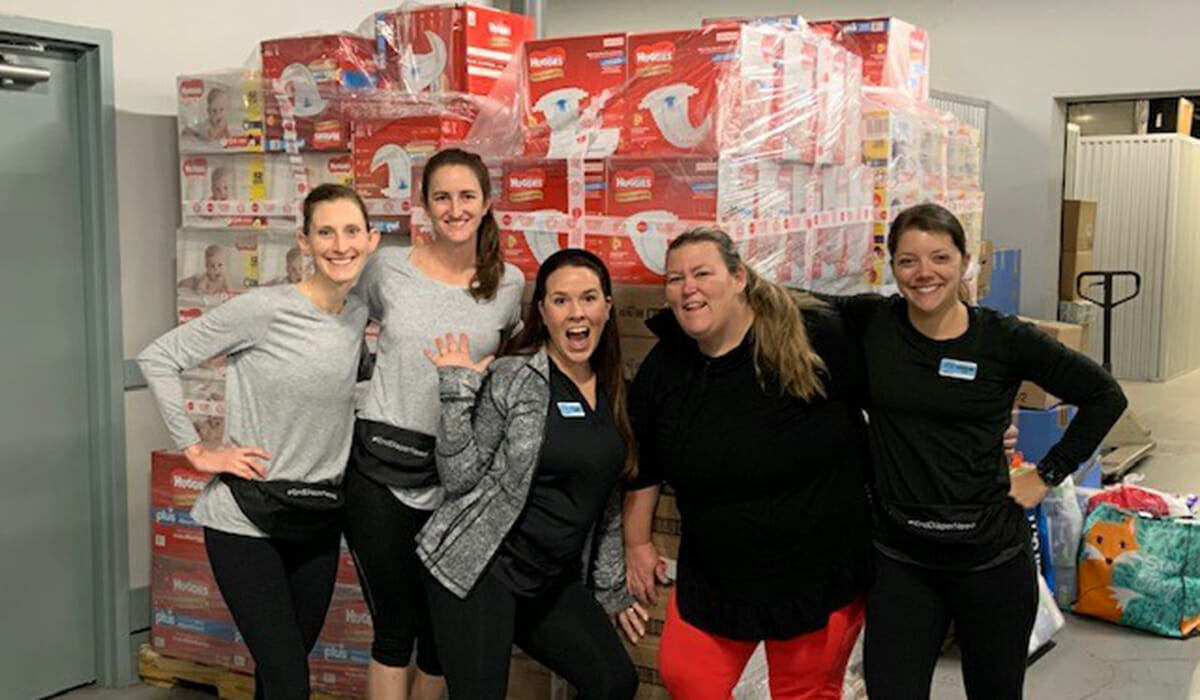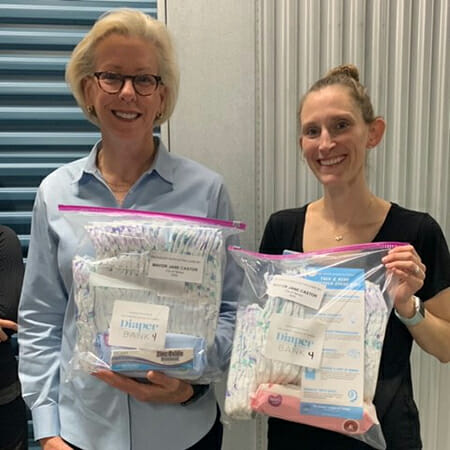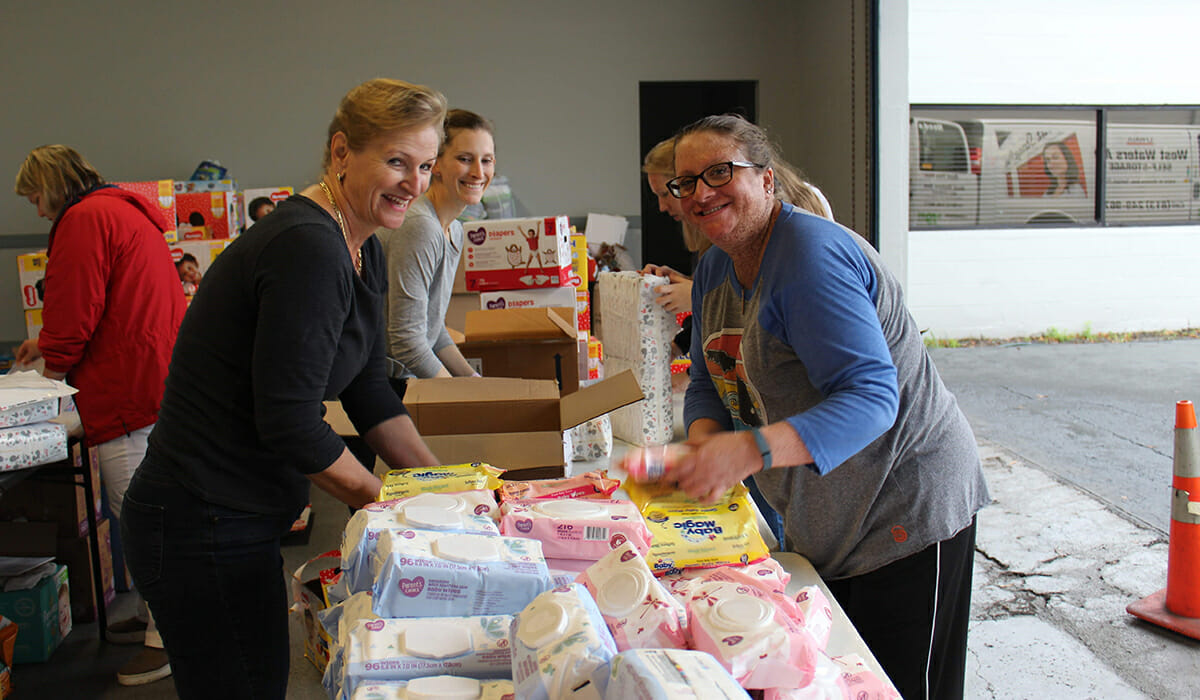Tampa Mom Helps Provide Thousands of Diapers to Community Members in Need

Meet Daily Point of Light Award honoree Lyndsey Siara. Read her story and nominate an outstanding volunteer or family as a Daily Point of Light.
One in three American families report experiencing diaper need, which can result in not only physical consequences for the baby, but also mental health consequences for the family or caregiver. Further, with most childcare centers requiring parents to provide a day’s supply of disposable diapers, the lack of this basic need can also prevent parents from working or going to school to further provide for their child. Along with her fellow volunteers at the Junior League of Tampa, Lyndsey Siara is looking to change that for her Hillsborough County, Fla. community.
Lyndsey serves as the Chair for the League’s Diaper Bank Project, which supplies diapers, wipes, diaper rash cream, and period products to nine community nonprofit agencies on a monthly basis, and many more on an as-needed basis. These community partners include organizations working toward preventing child abuse, supporting victims of domestic violence, and supporting teen parents balancing parenthood and completing school. Since its inception in 2018, the Diaper Bank has distributed over 454,000 diapers. Over 207,000 of those diapers have been distributed since March during Covid-19 relief. All while working full time and parenting her two small children, Lyndsey along with her team of volunteers help run the Diaper Bank by purchasing products, sorting donations, and packaging the products for the program’s partners.
“It is deeply important to me that I model for my children a servant’s heart, to care for their fellow humans, and to give selflessly to others,” Lyndsey said. “Every person can make a positive difference, and I’m just trying to make mine.”
Describe your volunteer role with the Junior League of Tampa Diaper Bank.
I am currently the Chair of the Junior League of Tampa Diaper Bank Project. It’s a project within the larger Junior League of Tampa organization. This is one of our many projects. This is going to be our third operational year. I’ve been involved since the inception. I first was a coordinator that was basically responsible for the operation, so purchasing and making sure we actually got the product out the door. Then last year I served as a Co-Chair with one of my fellow volunteers, and then this year I’m serving as the Chair of the Diaper Bank Committee.

Why was the Diaper Bank started?
We started the Diaper Bank after realizing there was not a diaper bank serving Hillsborough County. Hillsborough County is quite large. We have a population of nearly 1.5 million people, and approximately 15% live below the poverty line, so it was kind of shocking that there was not a bank servicing specifically our area. There is a diaper bank that services Pinellas County, which is across the bay from us, but there wasn’t a bank that was specifically servicing Hillsborough County. We realized the depth of the need after Hurricane Michael had come through and one of our League members had heard on the news the need for diapers and started researching where in this area she could donate diapers. That’s how we discovered there really wasn’t a diaper bank covering our area. That’s why it started, and it fits perfectly in line with the Junior League’s larger goals and missions.
For someone who may not be a parent or realize the seriousness of having access to diapers, can you talk about why having the Diaper Bank is so important to families in need in your area?
We’re a member of the National Diaper Bank Network, so we’re one of the member diaper banks. The network does a lot of advocacy and larger-scale education on diaper need. Based on their research, one in three American families report experiencing diaper need. Any parent knows how expensive diapers are — infants require up to 12 diapers a day and toddlers require up to eight, so it’s an average cost of $70-80 a month per child. Sadly there’s no state or federal child safety-net program that allocates dollars specifically for the purchase of diapers. WIC and food stamps, those don’t cover diapers, so any assistance that a family might be getting, the purchase for diapers goes in the same pot of what would be needed to pay for your rent or your utilities or your grocery bill, or whatever the case may be. … The babies need clean diapers. Without them, there’s all kinds of unfortunate consequences that can flow from not having clean diapers. Obviously there’s health consequences for the actual child, but there’s also documented research on the impacts of the caregiver and the feelings that are associated with not being able to provide what your child needs. It can be very damaging for the caregiver and the family unit. In addition, when families don’t have the diapers for the children, children can’t go to early childhood education programs or daycares because even the subsidized programs require parents to bring the diapers. You have to have a supply of diapers to drop your kid off at daycare so you can go to work or school to advance yourself. What you’re seeing is that diapers can be the linchpin in the cycle of poverty. If you don’t have them, then you can’t go to work, you can’t go to school to better yourself. They are a necessity, and they’re so expensive.
How do you distribute the diapers?
[The Diaper Bank] operates on a community-partner model, which means that we work with other nonprofit organizations within our community. We provide the diapers to those organizations that are running diaper programs, and they distribute them to their clients and users. For example, one of our organizations might have parenting classes, so the clients, the in-family user, would be coming to a parenting class and they would be provided a supply of diapers from our Diaper Bank in coming to those parenting programs. Some of our other partner organizations, they’re constantly visiting with their client families, so the case manager would bring diapers when they go visit with the family and when they’re otherwise providing services to the family. … Whenever we have a family in need, we direct them to one of our community partner agencies so that family can also be wrapped up in that service and any other services they may need that our partners offer.
Are there any future partnerships, programs, or events that you are excited about?
We are always pushing people to donate. … We adjusted our operations accordingly [due to Covid-19], but the fundraising piece, and the trying to get community donations and support, that piece is still in the development phase. I do know we’re going to be pushing out some campaigns around trying to get people to donate. We’ve been looking at some platforms almost like crowdsourcing where people can donate what they can donate and it all pools together to purchase a pallet of diapers or whatever the item is we put up there. We will have some campaigns that we will be pushing out on our website in the near future. People can donate at any time on our website or at our drop stops. We also have an Amazon wishlist, so we can be searched on Amazon and people can purchase the specific items they feel passionate about. They ship directly to our storage facility.
We’ve always provided period products as something our partners could order from us, but a couple months ago we officially became members of the Alliance for Period Supplies. That is an initiative of the National [Diaper Bank] Network, so that’s where the focus on the period products stemmed out of. We became members of APS and we’re going to be building out that arm of our operations this year. By doing that, we’re able to take on organizations and partners that maybe aren’t interested in diapers but they are into period products, so schools and populations that might not have children. We’ll be focusing heavily on combating period poverty in our area as well.
What’s been the most rewarding part of your work?
The most rewarding part is knowing that we’re making a difference. I have two children of my own and one is still in diapers. As a mom, I cannot imagine the feelings that you would feel if you could not provide such a basic need for your children. Our partners tell us all the time how thankful and grateful and life changing it is that we’re able to provide a basic need for their families. I think it’s just knowing that you are helping another family. You’re helping to keep a baby healthy and dry and safe, and you’re helping that family be able to go to work or go to school. You’re reducing the stress that is associated with not having clean diapers. It’s not just about a diaper. There’s so much more associated with diaper-need. And then for the relationships with our partners, we are huge help for them because they’re not having to allocate their own budget and dollars, which are often seriously lacking, or they otherwise just couldn’t provide diapers. It’s a great partnership because we’re able to support our partners in achieving their individual missions as well.

What have you learned through your experiences as a volunteer?
Even though I am a mother and I was a mother when I got involved in this project, I don’t think you fully understand diaper-need, or realize it is such the deep social issue that it is and the sort of the spider effect it can have. It’s not just about the diaper. Without it, you can’t go to school, you can’t go to work, you can’t drop your kid off at daycare. Then the health consequences, both physical and mental consequences, that can flow from having to stretch diapers or leave a baby in a dirty diaper. I think I’ve learned a great deal about a social issue that most people don’t understand exists or don’t realize is out there. … Even though you put a diaper on you kid every day, you don’t necessarily realize that people can’t afford to do that. Once you realize that is the case, it’s shocking and it’s heartbreaking. I would never want another mom or caregiver to have to feel like that if they weren’t able to put a diaper on their baby.
Why do you think it’s important for others to give back?
To make it a better place. For me too, a lot of it with my kids is showing my kids that it’s a generational thing for me. I want my children to see that I spend a significant portion of my free time trying to help the community and make it a better place and help impact positively our fellow community members’ lives. I want them to see that spirit of giving and caring. You can do anything with your time — you can watch TV, you can read books, you can do things that are for you — but I want them to see that a lot of my free time is given selflessly and with a lot of compassion and care to others to try to make their lives better. I hope that by doing that — even though how young they are, they probably don’t totally understand — it’s ingrained in them from such a young age. I’m hopeful they’ll want to model that behavior. I know my five-year-old understands, because before this Covid thing happened, she would come with me and help me package up diapers. She recently asked me, “How come I can’t [help]? I want to go help you with the diapers,” so I know she does understand. I want to model for them how to be a good community member.
Do you want to make a difference in your community like Lyndsey? Find local volunteer opportunities.
